Liu Zi Jue Editor and Creator - Zhang Ming Liang
CChealthqigong - Article Series
Writer/Translator: Angela and Ivy Ho
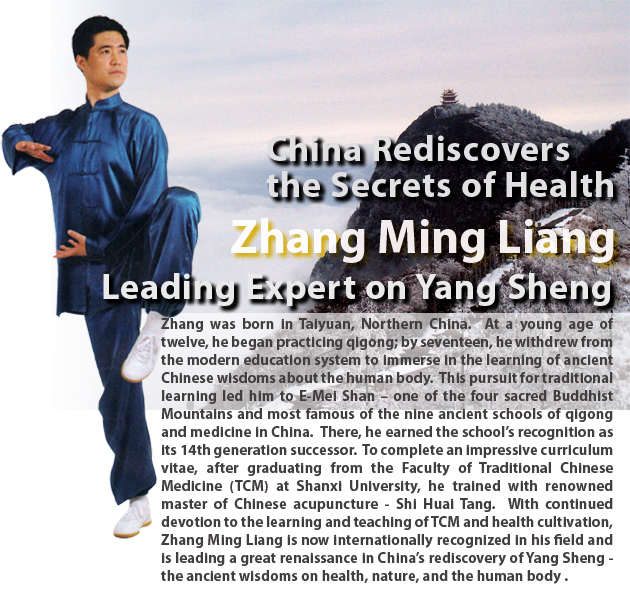
Encountering his Teachers and Mentors
1982 - China was beginning to awaken from solitude. In Taiyuan at the heart of Shanxi, Zhang Ming Liang was twelve years old. A strange encounter was to seal his destiny. “A man came to see my parents. He looked a bit strange, with a shoulder bag, as if descended from the mountain.” That man was Li Zheng Xiu (below right), one of millions who discretely guarded a part of China’s ancestral heritage. The impression he left with Zhang changed the young boy’s life. “I began learning qigong from him. It helped me understand the world differently. He told stories of Buddhism, Confucianism, Taoism, and also Christianity and Islam, opening my eyes to a universe that was unknown to me.”
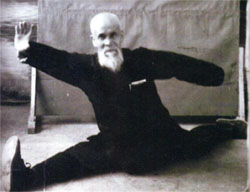
Since then, Zhang was constantly experimenting the depths of this ancient culture with his own body. When he was seventeen, he withdrew from school to delve wholeheartly into his passion. His parents were devastated. It took several years before they could understand and support their son’s choice. “My path eventually led me to one of the sacred Buddhism Mountains – Wutaishan, where I crossed paths with the great masters…” After years of intense practice, he enrolled in the Faculty of Traditional Chinese Medicine in Shanxi University and graduated in 1996. During that period, he had some key encounters. Leading representatives of the School of E-Mei, masters in acupuncture and medicine Dan Dao, were all professors at the Shanxi school. In a rare opportunity, they agreed to open the secret world of Mount E-Mei to Zhang. Along with Shaolin and Wudang, E-Mei was the most famous school of qigong and wushu in China. This school did not simply focus on the practice of qigong, but also required its students to train in a vast and rich curriculum including theories and practical skills in the cultivation of health, philosophy of Taoism and Buddhism, medicine, qigong and wushu. These were all linked to other subjects such as the study of food and medicinal herbs, ecology, environmental science, sociology, music, painting, calligraphy, etc. Furthermore, the school had strict requirements for the transmission of its teachings - only a chosen few could become true heirs of the masters, and thus, be privileged to their most secret knowledge and training. For Zhang, each master revealed only certain pieces of their knowledge. From there, he eventually synthesized his learning and earned himself the recognition of being the 14th generation successor of the E-Mei School of Taoist Medicine and Health Culture.
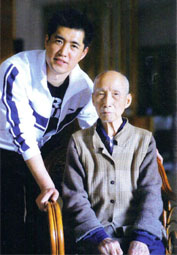
Among these masters, Xu Yi Guan (left) - director of the Association of Scientific Research on Qigong and Hygiene Bureau of Shanxi - took Zhang under his wings. Nearing Zhang’s graduation, he offered Zhang the opportunity to learn acupuncture with an inaccessible master, Shi Huai Tang. “You cannot imagine what this represents! He is very well known.” Zhang reminisced. Shi was the authority on nine needles acupuncture with an enormously published research. Zhang added, “Given his age, he would normally not accept that I work with him, at best, I would be working with his assistant.” In fact, the teacher had initially rejected Xu Yi Guan’s request. “I’m too old” he replied. But Xu insisted. “If this were a regular student, I would not insist. But he is different! Try three months, if it doesn’t work, I will take him back.” Xu never had to, and Zhang took the opportunity during this period to work among other eminent students, such as the Zhou brothers, sons of famous Zhou Qian Chuan, Taoist doctor (1907-1971) and the 12th generation successor of the School of Emei. Zhang was now part of the elite circle.
Truth is Discovered Within One’s Body
For Zhang, the basis of all his teaching is founded on the following approach: always experiment in the body what the mind grasps. “The spirit of Chinese culture cannot be taught by the head or only by reading. Knowledge and understanding must be acquired through the body and its training… the only truth is found in the body.” He also adds that this experimentation of the body is the only way to develop the essential subtle feeling (意-Yi). “In the practice of Qi, I advise everyone to notice his own feelings and their changes.”
"The spirit of Chinese culture cannot be taught by the head or only by reading. If we do not experience with our body, these are concepts that we’ll likely only speak about for a lifetime without ever understanding the meaning.”
On this method of learning, the School of E-Mei enforces a fundamental requirement: one must have several years of practice before he is allowed to speak about abstract concepts. Take, for example the ubiquitous concept of “丹田 Dan Tian”. Even though it is common knowledge that the lower abdomen is essentially the field (Tian), however, the way in which the body’s energy becomes “Dan” remains abstract. One must physically explore how and where the body’s dispersed energy (Qi) meets to become “Dan”. In basic terms, “Dan” emerges when “Qi” transcends into the “womb of breath” - the point where this energy shrinks to the size of a pigeon’s egg yolk while its power increases within one's “Tian”. “When you concretely feel this, your whole understanding changes and you can finally know the meaning and sensation of Dan Tian.” For Zhang, it is essential to experience the depth of Chinese culture through the body, whether they are concepts of the Taoist way or the notion of emptiness. “If we do not experience with our body, these are concepts that we’ll likely only speak about for a lifetime without ever understanding the meaning.”
A Doctor’s Skills and Attitude
Zhang admits that he has never read the founding texts of the School of Emei, be they Chan Buddhism (禪) or Taoism (道). For him, it is more important to acquire knowledge through practice in order to feed his capacity as a doctor and to sharpen a skill that is understood not only in terms of medical texts. He adds, “it is important to arrive at the understanding of the visible invisible crossroad. 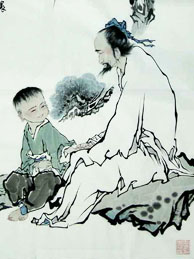 In other words, one must look beyond the concrete to grasp an idea; start anew by feeling with the senses and then gradually develop more experience in this abstract space. Then use the renewed idea to enrich the concrete. These are the foundations of Chinese culture. In all my classes, I stress this – it is the basis of my pedagogy.”
In other words, one must look beyond the concrete to grasp an idea; start anew by feeling with the senses and then gradually develop more experience in this abstract space. Then use the renewed idea to enrich the concrete. These are the foundations of Chinese culture. In all my classes, I stress this – it is the basis of my pedagogy.”
Thus, emerges an alternative doctor whose practice combines the access of “Qi” with real knowledge and practical experience in TCM and Dan Dao. Moreover, he is driven by one essential principle: “the better we know ourselves, the better we know our patients”; meaning better self-knowledge informs more accurate diagnosis of one’s patients. This critical understanding of one’s internal workings is different from western notions of psychology. Instead, Zhang finds his "internal landscape" or "internal clarity" through the practice of qigong, Chan Buddhist meditation, and Taoist training.
Yang Sheng – Art of the Daily Life
Presently, Zhang Ming Liang travels throughout Asia, North America, and Europe to share his knowledge. He is often invited to lecture at some of the world's largest universities. At home in Beijing, he has created a research institute devoted to Chinese medicine and pharmaceuticals.
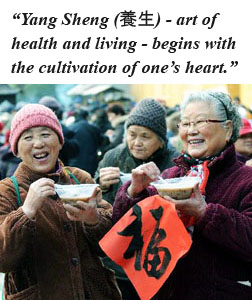
Whether at a stop between two flights or in the otherworldly mountains of E-Mei, Zhang releases an astonishing energy that comes from the depths of his being. “To nurture life, as in Yang Sheng, one must know to nourish the heart.” He explains. In Chinese culture, the heart is at once the seat of one's mind and emotion. Wisdom grows from a tranquil core and through the cultivated body, calmness emanates. This is the fundamental goal of Qigong - the interconnectivity and co-ordination of "Xing" (形-the physical), "Shen"(神-the spirit), and "Qi" (氣-the energy). "Practice allows me first to find a deep joy in my heart, but more importantly, it has gradually pervaded my daily life.”
Feeling of calm, the joy of living in the present… these advantages of health and fulfillment are not the only benefits of yang sheng. Everything begins from the heart, and everything is experienced through the body…And so, thousand years of ancient Chinese wisdom reminds us that one should nurture (養-Yang) life (生-Sheng) rather than simply trying to protect it.
Reference:
Faure, Sophie and Wen, Ke "Les Chinois Redecouvrent Les Secrets De La Sante." ChinePlus October/November 2009: 20-27.
Martin, Miguel. "Escuela Taoísta Alquimista E-Mei de Medicina y Cultivo de la Salud." http://www.daoyin-spain.com. 2008
(Interview with Zhang Ming Liang by Miguel Martin, director of Spanish Health Qigong Association)
The Canadian Chinese Health Qigong Organization began teaching health qigong style Liu Zi Jue this August. To provide our members with better knowledge about this style and its background, we are pleased to present the first of our article series. This piece is about Zhang Ming Liang, the editor-in-chief and creator of health qigong style - Liu Zi Jue.
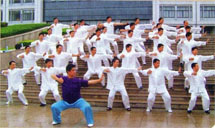
About Zhang Ming Liang
Zhang Ming Liang is a renown doctor of Chinese Medicine and leading expert in the field of health qigong and yang sheng. His expansive knowledge includes acupuncture, (Tui na) massage therapy, Emei yang sheng, qigong, yoga, meditation, Buddhism, and Taoism. In recent years, Zhang is comissioned by the General Administration of Sport of China to be editor, researcher, and developer of health qigong Liu Zi Jue and Yi Jin Jing. His schedule is also kept full with many invitations to international universities to give lectures. While in China he is a professor at the Beijing University of Chinese Medicine on the subjects of acupuncture and Tui na massage therapy.
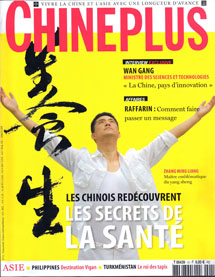
My Encounter with Zhang
Earlier this year, I had the good fortune to visit Zhang Ming Liang in Beijing and shared a lovely dinner. Zhang was a cultivated and accomplished young man who's no older than fourty. He was very approachable, easy to talk to, and had a wonderful sense of humour. While browsing through the collection of books at his office, one magazine caught my eyes. Out of curiosity, I asked Zhang what Chinese celebrity made it onto the front cover of a French magazine? He casually explained that this was "ChinePlus", a French publication about global Chinese culture and interviews were done on internationally accomplished Chinese men and women. Zhang himself was the cover story of the issue I had in my hands.
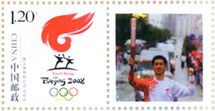
So, I leafed through the long article and one particular photo touched me: it was a 2008 Olympic stamp commemorating Zhang as a torch bearer. After seeing the interesting pictures, I became very curious about the content of the article. And Zhang readily obliged, sending me a digital copy of the interview. With his permission, I have published my translation of the article onto our CChealthqigong website.
Personally, I found the background of Zhang to be extremely interesting. His knowledge in ancient Chinese wisdoms on the human body was an eye-openner. I hope this article will help our members and others to understand the origins of Health Qigong - that elegant exercise we meet up for every week.
- Angela Ho
Zhang - on Qigong
"Qigong is an ancient Chinese practice that aims to promote health and cure diseases, to prolong life, promote the growth of wisdom, cultivate the mind, and help one to explore the secrets of the human body and nature.
There are nine traditional schools of qigong in China – E-Mei, Shaolin, Wudang, Qing Cheng, Hua Shan, Kong Dong, Tian Tai, and Xiu Kun Lun Shan. Each has its own integrated training system. A true descendant or master of these schools must learn and have a deep knowledge in a variety of areas, including wushu, qigong, Chinese medicine, Buddhist and Taoist philosophy, which are interlinked and all deal with life and the human body.
These ancient schools have strict requirements for the transmission of its teachings. Only the true heirs of a master may be privileged to acquire the secret knowledge and training of the school. Thus, this ancient knowledge is difficult to learn even in China itself, where you can only hear about them through legends. Much of qigong and existing forms of martial arts that can be learned in China today have been recently created. Even though they are based on teachings of the ancient schools, they are very different from traditional training.
One important aspect of qigong is related to the culture of health, and treatment of diseases. This is a very important component of traditional Chinese culture. This part of qigong in not secret and is accessible for everyone. References to it can be found everywhere - in the daily lives of the Chinese people, in our books, and in our art. Therefore it is good to allow more people to learn about this part of qigong, letting them to know the purpose of its existence while helping them become healthier and live a longer and better life."
Zhang - Yang Sheng Tips
Zhang disclosed that even though he spends most of the year in different countries giving lectures, he never experiences jet lag. This is because he follows an ancient Chinese lifestyle - scheduling his day and night by looking up at the sky. When the sun rises, he wakes up to work, and when sun sets, he returns home to rest; thus, synchronizing his daily life with the tempo of nature.